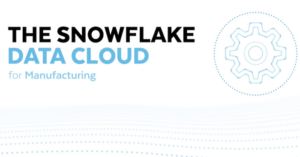
Snowflake Introduces Manufacturing Data Cloud to Empower Industries with Data and AI

(PopTika/Shutterstock)
Data and AI technology for manufacturing is having a moment. As AI has expanded its lengthy reach into manufacturing, there have been several purpose-built releases lately from companies like Nvidia and Databricks that are helping companies make sense of the deluge of data collected on everything from physical operations to the supply chain.
Snowflake is now part of this action with the debut of its Manufacturing Data Cloud. The company says this new offering will enable companies in the automotive, technology, energy, and industrial sectors to tap into the value of siloed industrial data by leveraging Snowflake’s data platform, partner solutions, and industry-specific datasets.
The Snowflake Data Cloud provides a platform for data warehousing, SQL analytics, machine learning, data engineering, and monetization of third-party data. The Manufacturing Data Cloud builds on those capabilities with industry solutions to help manufacturers build a foundation for their business, improve supply chain performance, and drive smart manufacturing initiatives. The data cloud is a fully managed, secure platform with unified governance and multi-cloud data consolidation capabilities that the company claims can support virtually any scale of storage, compute, and users.
“We’re incredibly excited about the Snowflake platform and our partner solutions and data coming together in the Manufacturing Data Cloud because we know that it’s going to be a big help to manufacturers,” said Snowflake Global Head of Manufacturing Tim Long in an interview with Datanami.
Long leads the go-to-market team for the sector and has been collaborating with over 50 partners for this launch. He meets with hundreds of global manufacturers to understand what challenges they face while drawing from his 20 years of experience in the semiconductor manufacturing industry. Long led the data and analytics practice at semiconductor manufacturer Micron, which adopted Snowflake and found it was the best platform for unifying the company’s data and improving factory performance. “We moved our entire manufacturing data footprint from on-premises to Snowflake in the cloud in just four months’ time,” he said. “Through that experience, I know firsthand what manufacturers are facing in terms of the opportunities and the struggles they have with data.”
Optimizing Supply Chain Performance with Visibility
 Supply chain performance has massive ramifications for successful manufacturing operations, and Long believes that looking outside of the factory’s four walls at what is happening with the entire supply chain is key: “It’s our thesis that improving the performance of that business, the path to that is through better visibility. And the means to improve visibility is to have better data that extends outside of the first party data, outside the enterprise’s immediate view.”
Supply chain performance has massive ramifications for successful manufacturing operations, and Long believes that looking outside of the factory’s four walls at what is happening with the entire supply chain is key: “It’s our thesis that improving the performance of that business, the path to that is through better visibility. And the means to improve visibility is to have better data that extends outside of the first party data, outside the enterprise’s immediate view.”
Snowflake’s Manufacturing Data Cloud promotes downstream and upstream visibility through data sharing and collaboration across an organization’s entire supply chain by joining its proprietary data with partner data and data from the Snowflake Marketplace. Companies can then leverage this data with SQL and Snowpark, which is Snowflake’s developer framework for Python, Java, and Scala. The platform allows different teams to collaborate with shared data to build AI and ML models for use cases like forecasting demand, raw material prices, and energy prices.
Snowflake Solutions are built on top of Snowflake and offer data connectivity using Snowflake’s data collaboration and can offer insight into how suppliers are performing. One of these partner solutions, available in the Snowflake Marketplace, is from shipment tracking specialist firm FourKites. The company provides near-real-time tracking insights for products shipped by land or sea, and manufacturers can tap into this FourKites data directly from the Snowflake Manufacturing Data Cloud. Long explained how they can then blend those insights with internal data to better prioritize their time in ensuring customer shipments arrive on time at a managed cost, while mentioning that 3M is a current customer of this feature.
Examples of other partners offering industrial applications include Avetta, provider of a cloud-based supply chain risk management and commercial marketplace platform, as well as supply chain optimization software specialist Blue Yonder, and cloud-native supply chain automation platform Elementum.
Among many technology partners in this release is AWS, with a solution to enable manufacturers to mobilize datasets that reside in different locations for comprehensive analytics. Another is Fivetran with a solution that automates aspects of the ELT process when moving data from databases like SAP systems and SaaS applications into the new Manufacturing Data Cloud. Dataiku is also a partner with a batch performance optimizer to ingest sensor, IoT, and historical batch data into Dataiku to assess and predict batch outcomes.
Ramping Up Factory Efficiency for Industry 4.0
Aside from supply chain optimization, Snowflake’s Manufacturing Data Cloud is also targeting improved factory operations.
“If we pivot and look inside the factory, we see manufacturers trying to drive efficiency using techniques like smart manufacturing, or what is sometimes known as Industry 4.0. This next revolution of industry is really attributable to what’s possible now with data and artificial intelligence,” said Long.
AI technology has greatly expanded data ingestion capabilities, and the Manufacturing Data Cloud offers native support for semi-structured, structured, and unstructured data, including high-volume IoT data from sensors and equipment located on the shop floor. Unifying this data in Snowflake assists manufacturers with streamlining operations across multiple plants with capabilities for predicting maintenance needs, analyzing cycle time, and improving product yield and quality.
Until recently, the shop floor has seen less technological progress than other aspects of manufacturing. Operations technology (OT) relates to the systems that run a shop floor that are central to the core manufacturing business. These systems are overseen by the engineers that run the floor and are often outside of the purview of IT, according to Long. OT data is generated from sensors and from legacy equipment that can sometimes be quite old.
“These data are often not usable by manufacturers because it’s so difficult to extract those data and bring them to a location where they can be mined for insights around product yield and factory efficiency,” Long noted.
A related Snowflake partner for this release is Riveron, an OT specialist packaging a group of technologies that Long says are best-in-class for bringing data from the shop floor, or what he calls Edge-to-Snowflake, in a scalable and efficient way.
One of Riveron’s offerings is from Opto 22, an industrial automation firm that produces a dedicated physical hardware device able to connect to many types of machine equipment using any available network interfaces. The device runs software from Inductive Automation, another specialist firm, that can translate across hundreds of communication protocols, bringing them all together in a standard messaging format, facilitated by Cirrus Link, to be streamed into Snowflake.
“[The solution] is fully edge-driven, meaning assets from the shop floor can be defined there,” said Long. “Definitions are things like ‘what is the asset itself, what measurements are being collected, what are the units of measure?’ and that information will flow directly into Snowflake where it’s dynamically materialized for analytics and Snowflake. No additional configuration setup is required to define those assets in the cloud, which we believe is unique to the Snowflake offering.” Long also mentioned that all different data types that are part of the Cirrus Link messaging standard are supported, which he says is another key difference of Snowflake compared to its competitors.
Driving Industries with Data and AI
Several large global manufacturers are already using the Snowflake Manufacturing Data Cloud, including computing interconnect supplier Molex, which is using the platform to drive its digital transformation efforts.
Another customer is Scania, a truck, bus, and industrial engine manufacturer that uses Snowflake to continuously stream data and support machine learning initiatives for monitoring vehicle performance.
“As they are pivoting towards electric vehicles, they are realizing how important data is to the success of the next generation of their products,” Long said of Scania. “They’re using Snowflake to capture that connected vehicle data across 600,000 trucks on the road and use that data to provide high-value services back to the truck operators–things like optimized maintenance schedules, recommended adjustments in how those vehicles are being operated, etc., to get the most value and performance from the vehicle.”
“Snowflake’s Manufacturing Data Cloud has provided the data foundation we needed to unlock insights from the 150 million streaming messages we received from our fleet of 600,000 vehicles,” said Peter Alåsen, product owner at Scania, in a release. “With Snowflake, we’ve been able to reduce downtime for customers by recommending maintenance based on vehicle operation and workshop availability, while also increasing revenue-generating activities around service and with other digital or physical services.”
Long is enthusiastic about the global prospects and opportunities that the new release holds for manufacturers worldwide: “There are so many opportunities that we’re unlocking with Snowflake in the Manufacturing Data Cloud. And we’re just so excited to share those with the world,” he said.
Related Items:
Snowflake Reflects on 10 Years Passed, Ponders 10 Years Ahead
Snowpark for Python Now Generally Available
Snowflake Unveils Native Apps, UniStore, and More Python Support at Summit


































